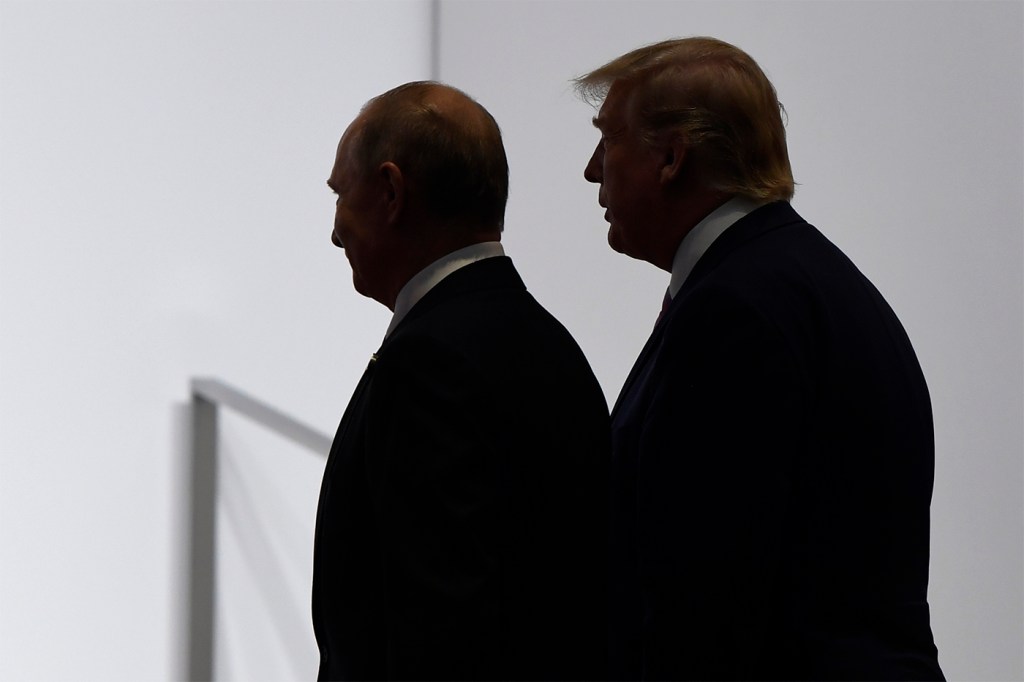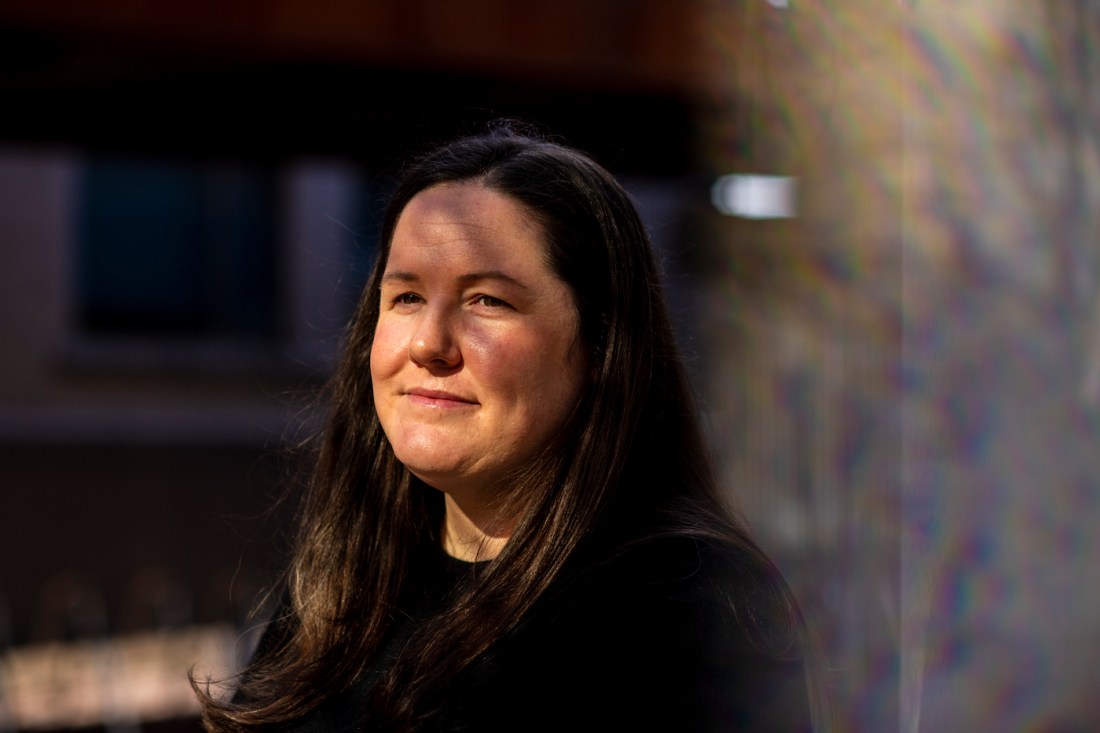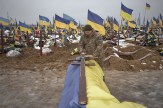How would a second Trump term impact NATO, US-Russia relations, the war in Europe?
Trump’s latest comments point to any number of plotlines for the country’s relationship with NATO and Russia under a second Trump term, according to one Northeastern political scientist.

In light of former President Donald Trump’s comments about NATO and Russia last week, it’s not unreasonable to think that a second Trump presidency might shake up U.S. foreign policy dynamics among allies and enemies alike.
After Trump said last week that he would encourage Russia to do “whatever the hell they want” to NATO states that hadn’t paid their share in defense dues, the former president doubled down on Wednesday, telling a crowd in South Carolina: “Look, if they’re not going to pay, we’re not going to protect, OK?”
Each NATO country is expected to set aside roughly 2 percent of its gross domestic product to put toward defense — though such a commitment is not required. But NATO Secretary-General Jens Stoltenberg this week acknowledged, while rebuking Trump’s comments, that some members have fallen short of their target.
Should Trump survive the onslaught of legal challenges before him and best President Joe Biden in a rematch of the 2020 presidential election, how might the situation in Europe change? With domestic aid for Ukraine balanced on a knife’s edge, some experts have expressed concern about what a lack of long-term U.S. support for the war effort means for Western cohesion.

Julie Garey, an associate teaching professor of political science who specializes in international relations and U.S. foreign policy, says Trump’s latest comments point to any number of plotlines for the U.S. relationship to NATO and Russia under a second Trump term.
Northeastern Global News spoke to Garey about what the future might hold. Her comments have been edited for brevity and clarity.
What did you make of Trump’s comments about NATO? How do you imagine they play into how he would handle the dynamic between NATO and Russia were he to be reelected?
I don’t think we can really understand what the relationship will look like in isolation. But Trump has served as president, and we know a little bit about what that meant for NATO and Russia. We could probably make a few educated guesses as to how things might turn out.
When Trump was campaigning in 2016, a big part of his platform regarding NATO was that the allies weren’t spending enough. I think that he, now as he did then, mischaracterizes how NATO spending actually works, and I don’t know if that’s a genuine misunderstanding on his part or just political maneuvering. But once he was elected, his rhetoric did shift. Whereas he once said that NATO basically served no purpose, he then said that it does. This did affect the NATO alliance, and I assume that it affected the way that Russia and Putin perceived the U.S. under Trump.
Again, there are a couple of ways that we could theorize how this turns out. One way is that it does have an effect on a potential Trump administration from day one; that Russia and NATO take [his comments] seriously, and if he is elected and assumes office, that could have cascading effects. The other side is to view them as kind of meaningless, because if you look over the course of the last eight years or so, Trump has wavered in his perception of both NATO and Russia. Trump, as we know, tends to often go off the cuff, and when he does, it’s hard to really understand his true position.
Is Trump’s criticism valid?
The criticism of NATO allies not spending enough on their own defense is not unique to Trump. We have heard this before under previous administrations, and from both sides of the aisle. We also know that defense spending in these [nations] has increased, though not universally. But many [nations] have increased their defense spending. It is hard to say whether that is the result of the 2014 invasion of Ukraine, or the 2014 Wales Summit pledge, or a result of the Trump presidency, or the second Ukraine invasion in 2022, or something else entirely. On that note, however, I think some European allies have said we have to increase our ability to work together without the Americans. We can’t count on the U.S. under Trump or under a different presidency, and that to me is not good for the United States, but it could be interpreted in a couple of different ways if Trump is elected again, and he surrounds himself with these kinds of anti-NATO folks or these anti-interventionist or anti-internationalist folks. I think they’d say, ‘OK, Europe is situated; they’re spending more, we don’t have to worry about them,’ and then he [Trump] continues along that path of using that rhetoric and pulling away.
On the other hand, some would say that part of why NATO exists is to keep these states together. I mean, it was to keep the U.S in Europe, but it was also to make Europe more cohesive, and when you start having lots of states spending more money on defense, and you have differing priorities and the rise of domestic nationalist groups in Europe, who are also calling for isolationism or pulling away from this shared mission — it could really go quite poorly and potentially threaten U.S interests.
Do you see Russia’s war in Ukraine continuing well into the next U.S. administration — and even beyond it?
I haven’t watched all of Tucker Carlson’s interview with Putin, and I don’t know if he even asked those kinds of questions about the state of the war. But through his words and actions, Putin has made it very clear that he does have an endgame: he sees Ukraine as part of Russia, and there’s very little, it seems, that would stand in his way of pursuing that goal.
Featured Posts
There is a major political debate in the U.S. about continued aid, and it seems like in some ways unprecedentedly, there is a lot of disagreement from Republicans — which would of course play into a Trump presidency — about whether the U.S. should continue to fund it. The Europeans are stronger overall in their commitment to continuing to support Ukraine and to fight back against this kind of Russian revisionism. They also, again, are really committed to spending on their own defense.
When I talk to individuals who represent these other governments, many of them say we didn’t need the Ukrainian invasion to tell us that Russia is becoming an increasing threat. So I think they are more firmly committed and in many ways than the U.S. is, and there’s not as much disagreement domestically within those countries. How long that sense of unity continues: it’s not clear. It depends on their forecasts of how the war is going, and how their needs continue to be threatened, and likely how the U.S. continues to behave in engaging with NATO. But for the foreseeable future, I see the European commitment remaining strong.
Since you mentioned Tucker Carlson’s interview, I’m wondering if you think Trump — again, were he to win this year — would ever travel to Russia and meet with Putin in the middle of this war? How do you think such a trip would be perceived?
I don’t know if it’s a possibility that Trump would actually travel to Moscow or elsewhere to meet with Putin. I do think that NATO and the U.S. have in the past said that pursuing diplomacy is a good thing, right? It opens up lines of conversation. Russia and NATO worked together through the NATO-Russia Council for many years because they saw it as an opportunity to address shared interests. But I think it is very unlikely, even in a Trump presidency, to have a meeting that would result in some kind of concession from Russia. What’s more, I think that NATO allies and many in the U.S. would see [a meeting] as a failure — as more political in nature than diplomatic.
My impression is that, since 2014, Putin doesn’t really consider anyone a friend. For him, it’s about achieving these political or military or economic outcomes, and I think he is so distrusting of anyone who tries to develop those relationships with him that, if there ever was such a meeting, there wouldn’t be any substance to it. It would be viewed as a kind of political stunt.
And then if Trump came out and spoke very positively and said that he supports what Putin is doing and was very sympathetic, obviously that’s going to negatively impact the NATO alliance. If he comes out and says, I don’t see an end to this; this is a protracted conflict, etc., and it kind of takes a more neutral position of just describing the reality — I don’t know what effect that would have.











